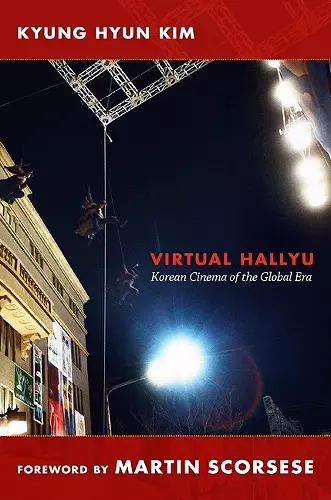Virtual Hallyu
Korean Cinema of the Global Era
Format:Hardback
Publisher:Duke University Press
Published:10th Oct '11
Currently unavailable, and unfortunately no date known when it will be back

Maintains that the full significance of hallyu can only be understood by exposing the implicit and explicit ideologies of proto-nationalism and capitalism
A textual account of the hallyu (Korean wave) films popular internationally, especially in Asia, from the late 1990s until 200708.“[T]his fine book . . . . enlarges our vision of one of the great national cinematic flowerings of the last decade.”—Martin Scorsese, from the foreword
In the late 1990s, South Korean film and other cultural products, broadly known as hallyu (Korean wave), gained unprecedented international popularity. Korean films earned an all-time high of $60.3 million in Japan in 2005, and they outperformed their Hollywood competitors at Korean box offices. In Virtual Hallyu, Kyung Hyun Kim reflects on the precariousness of Korean cinema’s success over the past decade. Arguing that state film policies and socioeconomic factors cannot fully explain cinema’s true potentiality, Kim draws on Deleuze’s concept of the virtual—according to which past and present and truth and falsehood coexist—to analyze the temporal anxieties and cinematic ironies embedded in screen figures such as a made-in-the-USA aquatic monster (The Host), a postmodern Chosun-era wizard (Jeon Woo-chi), a schizo man-child (Oasis), a weepy North Korean terrorist (Typhoon), a salary man turned vengeful fighting machine (Oldboy), and a sick nationalist (the repatriated colonial-era film Spring of Korean Peninsula). Kim maintains that the full significance of hallyu can only be understood by exposing the implicit and explicit ideologies of protonationalism and capitalism that, along with Korea’s ambiguous post-democratization and neoliberalism, are etched against the celluloid surfaces.
“A highly informative and imaginative account of the multifaceted powers of virtuality that make up the unique phenomenon of Korean cinema in the early twenty-first century.”—Rey Chow, author of Sentimental Fabulations, Contemporary Chinese Films
“Coming close on the heels of The Remasculinization of Korean Cinema, his seminal analysis of the psychic and political foundations of the New Korean Cinema of the 1990s, Kyung Hyun Kim has now produced the essential text on hallyu, the phase of Korean cinema and related forms of popular culture that became a global sensation in the first decade of the new millennium. Bringing key Deleuzian concepts into focus with sensitive and nuanced readings of international blockbusters, including The Host (Bong Joon-ho) and Oldboy (Park Chan-wook), as well as the work of notable art-cinema auteurs, Kim establishes himself as not just the most important Anglophone critic of South Korean cinema but a key figure in film and cultural studies generally.”—David E. James, author of The Most Typical Avant-Garde: History and Geography of Minor Cinemas in Los Angeles
“[A]n impressive work. The book is timely without being trite or merely fashionable and it contains a number of significant theoretical and local insights into the global present without being uselessly obscure to the general reader. Kim’s incisive close readings of widely known South Korean productions (The Host, Old Boy, Secret Sunshine, etc.), as well as the potential to discover new titles, make the book a pleasure to read and to revisit for those inside, outside, or in between Korean studies.” -- Travis Workman * Journal of Asian Studies *
“[T]his is a book that needs to be read by anyone who is interested in the field [of Korean Cinema].” -- John Finch * Asian Studies Review *
" . . . Kim's book is special in that every effort was exerted to select the most relevant topics and issues for readers in a comprehensive and sophisticated way. I would recommend this book because it is a well-written and detail-oriented account of Korean movies . . . As all chapters are very informative and engage in theoretical arguments that are not just descriptive, this book will be very useful to readers who really love Korean films or are film majors in graduate programs and would like to gain a comprehensive knowledge of Korean cinema." -- Sang Yee Cheon * Korean Studies *
ISBN: 9780822350880
Dimensions: unknown
Weight: 526g
280 pages